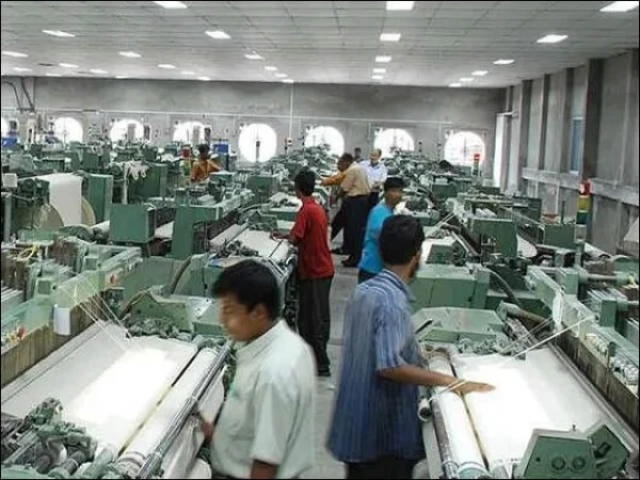Islamabad:
Friday, Pakistan Textile Council (PTC) raised concerns about the significant drop in exports and the closure of industries.
According to a council statement, exports fell 3.83% in the first quarter of the current financial year, totaling $ 7.61 billion. In September alone, exports fell 11.71%, or 2.51 billion dollars.
PTC also noted that the trade deficit widened to $ 9.37 billion in the same quarter, largely due to an increase of 13.49% of imports, exerting substantial pressure on the country’s external accounts.
Following these economic challenges, Gul Ahmed Textiles decided to close his export clothing segment, affecting thousands of workers, observed PTC.
Several large multinational companies, including Procter & Gamble, Microsoft and Shell, have either left Pakistan or have considerably reduced their operations. PTC cited the increase in energy costs, high taxation and the uncertainty of policies as key factors at the origin of these decisions.
The Council has urged the government to implement immediate reforms, warning that without rapid action, more industries could close and the investment could continue to decrease.
PTC president Fawad Anwar stressed the need to provide regional competitive energy rates for export industries, improve tax policies and rationalize the reimbursement system to support the export sector. He warned that without these measures, the country risks a new contraction in exports, which would have a negative impact on the economy.
PTC previously criticized the recent modifications of the Federal Board of Revenue (FBR) at the Export Facilitation Scheme (EFS), warning that changes constitute a direct threat to the survival of textile exports and clothing of the country.
Read: The textile sector is looking for political interventions
PTC, which represents more than 30% of the country’s textile and clothing exports, submitted an official set of objections and recommendations to the FBR in response to the SRO 1359 (1) / 2025 of July 29, 2025.
The submission of the PTC, in accordance with the five -day window scheduled for comments, has strongly criticized recent EFS changes, warning that changes could paralyze the value -added export sector in Pakistan at a time of increased global economic uncertainty.
He stressed that EFS ensures the competitiveness of textile and clothing exporters. However, the changes have not only ignored the recommendations of a high -level government committee, led by the Minister of Planning Ahsan Iqbal, but have also introduced restrictive and impractical conditions which threaten the survival of the sector.
According to the PTC, one of the most damaging provisions is the exclusion of cotton, cotton thread and gray fabric of the range of EFS. “This clause must be immediately withdrawn,” said the Council, because it has never been agreed that these documents would be excluded. At most, a reimbursable general sales tax (TPS) on the cotton thread greater than a certain number was under discussion. “Their withdrawal of the program coverage is unjustified and economically reckless.”
Anwar described the “export tax” decision, saying that it would impose a serious financial burden on exporters already struggling with world protectionism, the increase in input costs and new trade barriers, including reciprocal tasks recently imposed by the United States. “The moment could not be worse. Exporters are under stress and instead of supporting them, the government pushes policies that increase costs and complicate operations,” he said.
The PTC policy note has recommended that the period of use of entries remains at 18 months, with the possibility of an extension of six months by the regulatory authority. Any extension beyond this should be subject to the approval of a committee named FBR. In addition, the Council suggests that unused entry materials should be authorized to be postponed the following year when submitting a declaration of reconciliation.
Find out more: Textile policy to make competitive industry
The mechanism of authorization for the acquisition of entries should be more flexible. For new EFS users, the regulatory authority may approve provisional authorization up to 50% of the production capacity requested, the rest granted on the verification of the capacity by the organization of the entry output coefficient (IOCO).
The Council urged the FBR to pass bank guarantees to insurance guarantees, noting that the latter would considerably reduce the burden of compliance and financial stress for exporters. He highlighted the operational involvement of the restrictions of new suppliers in the manufacture of tolls.
Under the current modification, the goods sent for external treatment must be returned within 60 days, the details of the suppliers must be pre-recorded and any subsequent modification requires prior approval of the collectorate. The PTC argued that these requirements are unnecessarily rigid and disrupt operational flexibility and negotiations with subcontractors. He urged the deletion of excessive data requirements, such as the number of vehicles, and called for the extension of the duration of toll manufacturing.
The council rejected the proposed rule forcing physical sampling to verify the use of imported inputs. He called for the reintegration of the original sampling provisions marked by the exam, stressing that the new rule would delay exports and create bottlenecks in the verification process. Finally, and above all, the PTC demanded the immediate reversal of the exclusion of cotton, cotton thread and gray fabric of the EFS. These materials are fundamental for the textile value chain and exclude them will require exporters to support the initial rights and taxes in the event of net currency.




